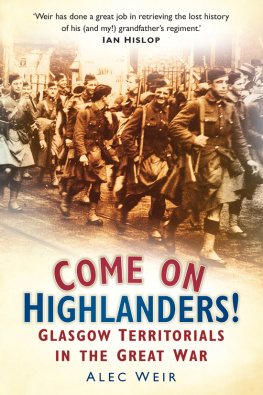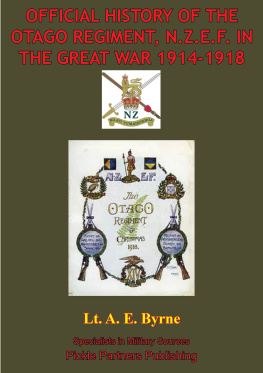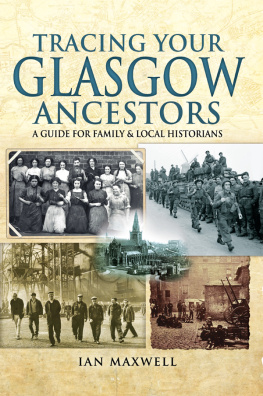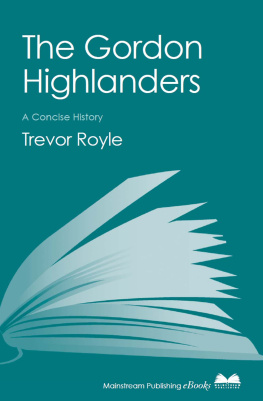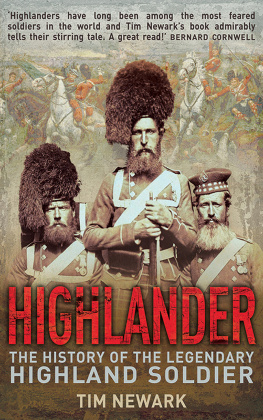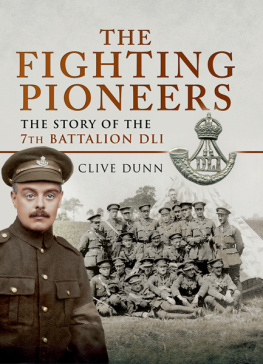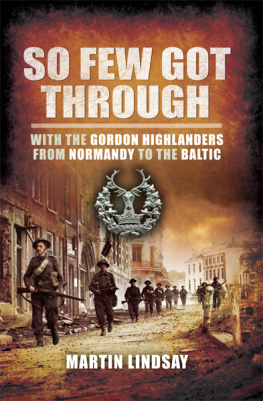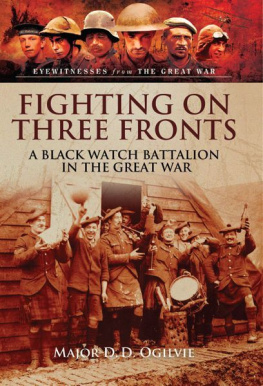COME ON
HIGHLANDERS!
COME ON
HIGHLANDERS!
G LASGOW T ERRITORIALS
IN THE G REAT W AR
A LEC W EIR

First published in 2005
This edition first published in 2009
The History Press
The Mill, Brimscombe Port
Stroud, Gloucestershire, GL 5 2 QG
www.thehistorypress.co.uk
This ebook edition first published in 2013
All rights reserved
Alec Weir, 2005, 2009, 2013
The right of Alec Weir to be identified as the Author of this work has been asserted in accordance with the Copyrights, Designs and Patents Act 1988.
This ebook is copyright material and must not be copied, reproduced, transferred, distributed, leased, licensed or publicly performed or used in any way except as specifically permitted in writing by the publishers, as allowed under the terms and conditions under which it was purchased or as strictly permitted by applicable copyright law. Any unauthorised distribution or use of this text may be a direct infringement of the authors and publishers rights, and those responsible may be liable in law accordingly.
EPUB ISBN 978 0 7524 9588 0
Original typesetting by The History Press
C ONTENTS
P REFACE
T he Glasgow Highlanders were right at the heart of the cataclysmic events that unfolded between 1914 and 1918 on the Western Front. They were one of the first Territorial units to be rushed to France when reinforcements were desperately needed in 1914. They continued there throughout the next three years of stalemate, participating in almost all of the major British battles Festubert, Neuve-Chapelle and Loos in 1915, the Somme in 1916, Arras and Ypres in 1917. They were still there when, by March 1918, the Germans had at last defeated the Russians and were thus able to concentrate their full attention on the war in the west. The Glasgow Highlanders in fact played one of their most valuable roles of the entire war at this time. Finally, when the Germans began to crumble, the Glasgow Highlanders were right at the heart of the last big Allied push which drove the invaders back until they finally accepted defeat.
Like the apocryphal George Washingtons axe two new heads and three new handles the composition of the battalion at the end of the war was almost entirely different to that at the beginning. Most of the originals Territorials had gone even by the end of 1915. The volunteer replacements who joined during that year were also largely gone by the end of 1916. From 1917 onwards replacements were either conscripts or came from a variety of other regiments. But despite all these transformations the ethos of the battalion, built up over forty or so years pre-war, somehow survived, and the Glasgow Highlanders, as a battalion, marched away from the war with their heads held as high as when they went in.
They were a remarkable body of men. On the one hand they had the openness, straightforwardness and tremendous good humour that are typical of Glaswegians but they also had the bottle. They were driven to be, and succeeded in being, formidable fighters, and the Germans quite rightly learned to fear them as terrible Highlanders.
I NTRODUCTION P IECING IT A LL T OGETHER
A SIMPLE QUESTION BUT NO REAL ANSWER
W hen I was born, the Glasgow Highlander who had been the battalions Regimental Sergeant Major at the beginning of the war, and then later became their adjutant, was Major Frank Ernest Lewis MC DCM. To me though he was just granddad. By the time I wanted to know more about who he was and what he had done I knew perfectly well that he himself had not been around for quite a few years, but I was taken aback when the response to my simple question within the family: What did granddad do in the Great War? got no further than an extremely vague: Er, he was in the Scots Guards... I think... er wasnt he?
I was really stunned though when the answer to my next question, as to what had happened to all granddads papers, memorabilia, books and so on was: All gone... he had that attic study at home full of things to do with the First World War... but after his death they were all thrown out. All trace of him seemed therefore to have disappeared, and besides this being a shock, what chance was there now of getting an answer to my question?
THEN A REVELATION
Not much, I thought, but then someone suggested writing to the army records office. It was something of a palaver to get the Ministry of Defence (MoD) application form completed in the right way, and I then had to wait six months to get a reply, but when it came there was a whole page and a half of information.
In particular it told me that my grandfather had been a regular, that he had enlisted as a private when he was not yet seventeen and then, in the middle of the First World War, been commissioned as an officer. His army career spanned nearly thirty years from 1900 to 1927, and while yes, up to 1917 he had indeed been in the Scots Guards, he was thereafter in the Cameronians (Scottish Rifles) and then, postwar, the Kings Own Scottish Borderers.
What stood out though was that, although technically belonging to these other regiments, he had spent the entire period of the First World War attached to the 9th Battalion Highland Light Infantry, better known as the Glasgow Highlanders.
ANOTHER IMPASSE...
This surely gave me the solution. If I wanted to know more about what my grandfather had done in the Great War and I did, because the information provided by the MoD had whetted my appetite all I needed to do was get hold of a history of the Glasgow Highlanders? Unfortunately no, because I couldnt find one. Initially I felt sure that I was just not looking in the right places, but eventually, after finding my way to the military history specialists, I was told that so far as they were aware no such thing as a published history of the Glasgow Highlanders had ever existed.
It seemed like another dead-end. Perhaps after all I would just have to be content with the information provided by the MoD?
... AND ANOTHER SHOCK
That might have been the case had it not been for someone in the family coming up with an obituary of my grandfather clipped from the Glasgow Herald. Id already picked up from the MoD letter that he had been decorated with the Military Cross and Distinguished Conduct Medal and twice mentioned in despatches which, in my ignorance at this stage, meant all too little to me; but I was particularly struck by how the newspaper referred to my grandfathers distinguished service and the description of him as one of Scotlands best-known soldiers. Surely, as this obituary was as recent as the mid-1960s there must, somewhere, be more still to find out, even if not about him, then about the Glasgow Highlanders?
At least I could make a symbolic pilgrimage to his grave. I knew hed been buried at Largs on the Ayrshire coast in Scotland because Id been at his funeral, but not living in Scotland I wasnt handy for a visit. Eventually though I made the journey, and the first part, finding the cemetery, wasnt a problem. Its on high ground overlooking the sea, and there are stunning views over the water to the Isles of Cumbrae in the near distance and Bute and Arran further away. But I couldnt find his grave. I asked. The people there helpfully looked up the records and from this his plot was identified. But there was no marker, no stone. In this very large cemetery with countless tombstones, old and new, what was there to mark the last resting place of one of Scotlands best-known soldiers? Absolutely nothing.

